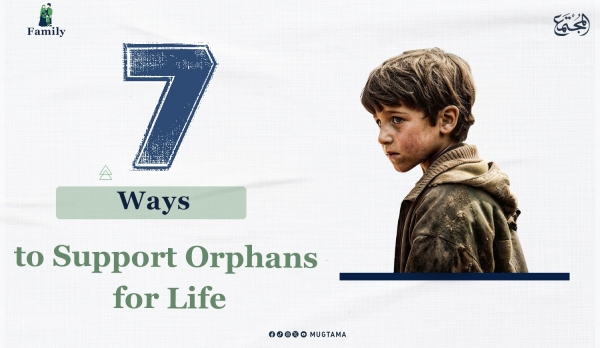The world celebrates “Orphan’s Day” on the first Friday of every April, a matter that Islam has paid attention to for over fourteen centuries. The Noble Quran encouraged sponsoring orphans, caring for them, and providing all forms of support and compassion.
An orphan is someone who has lost his father while still a child, before reaching puberty, whether male or female. Once they reach adulthood, they are no longer considered an orphan in Islamic Sharia. Allah warns against treating orphans harshly or neglecting them, saying: “Have you seen the one who denies the Recompense? {1} For that is the one who drives away the orphan” (Al-Ma'un: 1–2)
The Noble Qur’an also encourages the care and financial support of orphans. Allah says, “And they ask you about orphans. Say, ‘Improvement for them is best. And if you mix your affairs with theirs—they are your brothers. And Allah knows the corrupter from the amender. And if Allah had willed, He could have put you in difficulty. Indeed, Allah is Exalted in Might and Wise.’” (Al-Baqarah: 220) He also says, “And they give food in spite of love for it to the needy, the orphan, and the captive.” (Al-Insan: 8) And: “Or [by] feeding on a day of severe hunger {14} An orphan of near relationship” (Al-Balad: 14–15)
Despite the significant emphasis the Noble Quran places on this subject in multiple ayahs, the attention given to orphans tends to be intense in the initial days and weeks following the death of a parent. However, that care often fades with time.
Initially, there are essential steps to be followed when dealing with a child at the time of losing a parent. These include allowing the child to cry and release emotional energy, then calming the child in a way suitable for their age. Alongside this, a simple explanation of the concept of death should be offered, such as saying that their mother or father is now in a better place, by the will of Allah, and is enjoying the bliss of Jannah, and is in need of the child’s du’a and request for Allah’s mercy and forgiveness.
Experts warn against leaving the orphan alone for extended periods, especially during the first months after losing a parent. They also caution against collapsing emotionally in front of the orphan or constantly weeping and mourning in their presence. It is crucial to seek out activities that engage the child and distract them from fixating on the idea of death, as this could lead them to suicide in an attempt to reunite with their deceased parent.
Modern studies recommend surrounding the orphan with righteous friends who care for them, and involving them in beneficial social, athletic, and recreational activities. Showering the child with love, attention, and appreciation helps them overcome this intense crisis, particularly during the early months.
On a sustained and systematic level, making an orphan happy, not just in April but throughout their entire life until they grow into adulthood, requires the following steps:
First: Sponsoring and showing kindness to the orphan. Sahl ibn Saʿd reported that the Prophet ﷺ said: “I and the one who looks after an orphan will be like this in Paradise,” showing his middle and index fingers and separating them. (Narrated by al-Bukhari)
Second: Feeding the orphan and alleviating their hunger. The Prophet ﷺ said: “Whoever takes in an orphan among the Muslims to raise, to feed him and give him drink, until he becomes independent, paradise will be assured to him.” (Narrated by al-Ṭabarani, authenticated by al-Albani)
Third: Providing a nurturing environment, educational, health-wise, psychological, and social, ensuring a sense of family security by offering them access to education, development, and other opportunities available to their non-orphan peers. This should be done within an integrated framework of care, so they do not feel deprived or disabled.
Fourth: Offering emotional support through counseling sessions and interactive programs that protect them from the effects of family loss, feelings of loneliness, isolation, and depression. This strengthens their self-confidence and social skills, enabling them to build healthy, balanced relationships.
Fifth: Strengthening the orphan’s connection with caring relatives such as grandparents, uncles, and aunts by organizing regular family gatherings and shared activities. This helps the orphan integrate into a supportive environment and build strong familial bonds.
Sixth: Granting the orphan educational and vocational opportunities that align with the modern age, equipping them scientifically, and helping them acquire marketable skills and knowledge of emerging technologies. This will provide them with independent job opportunities and income sources so they are not a burden on others.
Seventh: Promoting their development on all fronts, religious, educational, ethical, and social, ensuring their protection and moral integrity, and eventually helping them marry a righteous spouse to compensate for the loss of their family and serve as a source of comfort and companionship.
-------------------------------------------------------------
